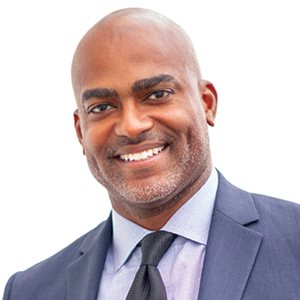Recently, I had the honor of speaking with the Cleveland State men’s basketball team, days after their overtime loss to Oklahoma State and their game with Duke University was canceled due to COVID protocols. Obviously, the team was disappointed. They were well prepared to upset a formidable opponent, but the pandemic had other plans.
I shared my experience of tearing my knee ligaments just hours before my first road trip as a freshman in college, which also included the opportunity to play basketball in Duke’s stadium. Although I can certainly relate to the disappointment these men are still feeling, I assured them that these experiences, both good and bad, are necessary to building the character needed to accelerate their professional careers after basketball.
Several of the student-athletes have since reached out to thank me for sharing my story, but I should be thanking them for reminding me of the journey and inspiring me to keep applying those lessons learned to my companies. I was surprised to hear that a couple of the players have already started their own businesses while still in college, or were studying entrepreneurism. One asked what he should be thinking about now as it pertains to growing a sustainable business in the future. I gave him a typical answer that included keeping his mind and body in shape and never stop networking. But as I think about it weeks later, that answer was admittedly outdated and underwhelming.
College students today are much smarter, knowledgeable and certainly more resilient than any generation that came before them. Because they grew up in a world with advanced technologies, they are prepared to handle a more fast-paced business environment than they may realize and, quite frankly, the business eco-system — including the global supply chain — is designed more for our youngest workers than most organizations are ready to admit.
Instead of a pat answer, I should have encouraged this budding entrepreneur and his teammates to look beyond the canned adages from parents and mentors, and instead study the lessons learned during COVID-19, such as how quickly environments can change and the importance of pivoting to stay relevant and within the field of play — just like in basketball.
After setting a goal for 2022 to be more intentional and present for my staff, my advice to him — and any college student today — is more direct. It’s the same I would give to any seasoned professional, any corporate leader and even the most progressive religious institution. We should all be doing whatever we can to understand the world of blockchain technology and cryptocurrency right now. The business world is quickly changing, and the pandemic has both exposed this fact and accelerated the need to get onboard the blockchain train that is moving at lightning speed. Successful organizations, whether for-profit or nonprofit, will be required to understand this technology that is more advanced than initiating a Zoom meeting, executing a basic Robinhood trade, or joining an online worship service.
The late Desmond Tutu once said, “Practice doesn’t make perfect, it makes better.” Who better to take the lead in our organizations than the generation that has the most practice with the dizzying pace at which technology is advancing in the world today? ●
Terrell Dillard is president and owner of Zaymat Distributors

